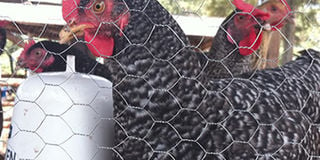Prime
The benefits of rearing Kuroiler chicken

A Kuroiler hen. Internet Photo.
What you need to know:
In a bid to increase the productivity of the poultry sector, the government initiated a project through which Kuroiler chicken were introduced in Uganda. The breed is better performing than the local ones and yet is easily adapted to the local conditions. This is the story of one woman in the context of the efforts to boost poultry farming.
After rearing indigenous chicken for several years, Ms Joy Lwanga, has adopted Kuroiler chicken which have being promoted as a higher yielding breed that is suited to the local conditions, to boost her output from her poultry farming. This translates into more income from the sale of meat and eggs.
“I am moving from keeping local chickens to a breed that is similar to the ones I have been keeping,” says Ms Lwanga. “Kuroilers have far more advantages than our local chicken.”
Although it is a difficult decision to take, considering that for almost six years, her preference has been local breed chickens, she emphasises the decision was carefully thought over.
“They can survive under the same conditions just like the indigenous one. But importantly their productivity is much higher compared to a local chicken,” she adds.
Kuroiler is a poultry breed from India known for its tasty meat in addition to its productivity and ability to survive in situations typical to any developing country like Uganda.
Grow faster
According to the experts at the National Animal Genetic Resource Centre and Data Bank (NAGRC&DB), Kuroiler chicken can live perfectly under what is described as “scavenging circumstances” and they also grow faster. However, they would need vaccination and de-worming for specific diseases.
While it can thrive in such situations, it is not encumbered by low productivity. It produces about 150 eggs in a year as opposed to the indigenous one, which does about 40 eggs in the same period.
The maturity period is about 10 weeks compared to the local breed that not only takes several months, but in some instances, even up to a year. At maturity, the chicken weighs about 3.5kg, making it a better broiler compared to the local breeds that normally weighs 2-2.5kg.
Significant boost
What is in it for Ms Lwanga is the business opportunity that, like any other entrepreneur, she wants to make the most of. “It is all about the profit at the end of the day,” she says, stressing that, “I would sell the local chicken at not less than Shs20,000 but the Kuroiler, which lays frequently can now fetch me about Shs30,000.”The price for a tray of eggs also varies. Whereas eggs from indigenous breeds cost no more than Shs15,000, the ones from Kuroiler chicken are likely to fetch almost double the price.
She started with 500 Kuroiler chicks, which she bought at Shs3,000 each. When these develop into layers or broilers, it would have put in more productivity over their life span, which is a significant boost to her poultry business.
And as far as the market for her produce is concerned, Ms Lwanga hopes to build on her current relationship she has since built with several retail shops that has transacted business with her Shalom Organic Farm Ltd over the years.
Currently, she supplies more than 400 trays of eggs to supermarkets once every week. To reach these quantities, she does with help from other poultry farmers whom she has mobilised and encouraged to keep in the business. In a month, it amounts to more than 1,600 trays of eggs supplied.
Among the challenges she faces is the length of time she gets paid, at times, ranging from two or more months, disrupting her cash-based operations.
Access to credit
Importantly perhaps, like many other farmers who are into commercial agriculture, the high interest rates for credit remains one of the most pressing problems.
This explains why Ms Lwanga who started out with about Shs3m to Shs4m in capital has never approached a bank for a loan. Her attempt to borrow ended when the one of the commercial banks fronted a minimum of about 22 per cent as an interest rate on the money would be advanced.




